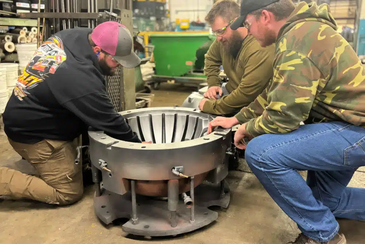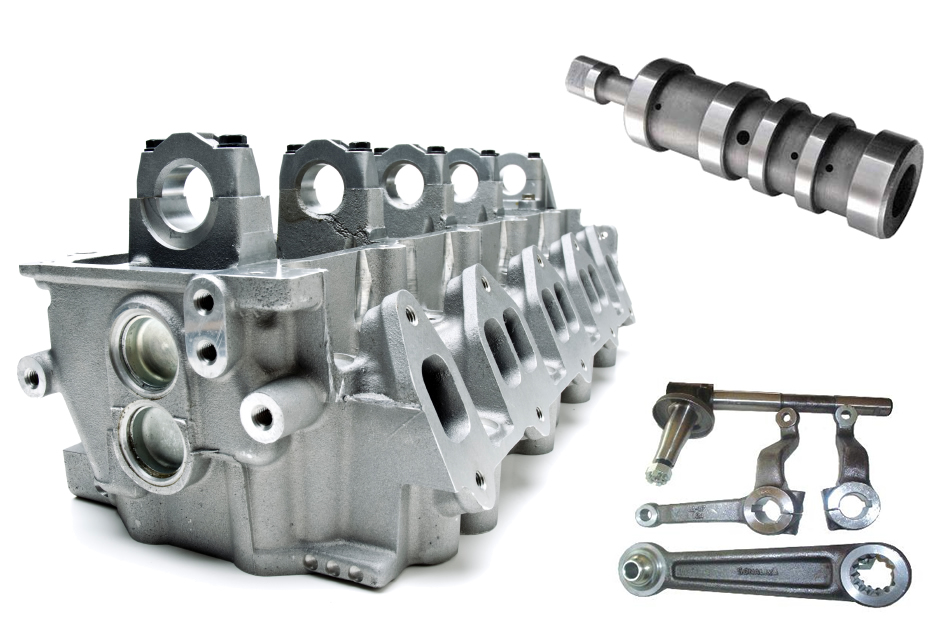A Comprehensive Guide to Choosing the Right Foundry Solutions for Your Job Needs
Picking the ideal factory solutions is crucial for the success of any type of project. Each casting technique-- sand casting, financial investment spreading, and pass away spreading-- has special advantages. Understanding these options assists in making informed choices. Material option, production abilities, and quality control are vital factors to take into account. Furthermore, evaluating expenses can affect long-lasting stability. Aluminum Foundry. What elements should assist this decision-making procedure?
Recognizing the Different Kinds of Factory Services
While the globe of factory services may appear facility initially glance, recognizing the different types can greatly streamline the production procedure. Foundries usually specialize in casting steels, and the major types include sand casting, investment spreading, die casting, and centrifugal casting.
Sand spreading entails producing molds from sand and is suitable for big parts or low-volume production. Investment casting, on the various other hand, uses high precision for complex layouts, making it suitable for aerospace or medical applications. Pass away spreading, defined forcibly molten steel into molds under high stress, is effective for automation of smaller sized components.
Centrifugal casting makes use of rotational force to disperse molten steel, producing strong, round parts. Each solution kind has distinctive advantages and is picked based upon specific project needs. Comprehending these differences enables producers to select one of the most proper factory solution, eventually improving performance and product quality.
Secret Elements to Take Into Consideration in Product Option
Picking the ideal product for factory solutions is an essential action that affects the total success of a job. Secret variables in product selection include mechanical homes, thermal resistance, and deterioration resistance - aluminum casting. Recognizing the intended application and its requirements is essential; materials need to withstand functional stress and anxieties while maintaining honesty with time
An additional important factor to consider is the material's compatibility with the chosen production process, as some materials are better fit for specific methods. Cost-effectiveness additionally plays a considerable role, as budget constraints can limit choices.

Finally, accessibility and preparation of materials can impact job timelines, making it necessary for task supervisors to examine these elements thoroughly. By thoroughly reviewing these aspects, one can guarantee a much more reliable and effective shop service experience.
Examining Manufacturing Capabilities and Technologies
Just how properly a factory can meet project specifications hinges on its production capacities and technologies. A complete analysis of these elements is important for job success. Production abilities incorporate the shop's capacity to take care of varying task timelines, complexities, and sizes. Comprehending the foundry's equipment and equipment is necessary, as modern innovations such as computer mathematical control (CNC) machining and advanced mold-making methods can greatly improve accuracy continue reading this and performance.
Furthermore, the factory's usage of ingenious materials and procedures, such as 3D printing or shed foam spreading, can use benefits regarding design versatility and cost-effectiveness. It is likewise crucial to examine the factory's ability to range production, guaranteeing that they can accommodate future boosts in demand without compromising top quality. By meticulously analyzing these factors, project managers can make educated decisions about which shop is best suited to meet their particular manufacturing requirements and technical assumptions.
Relevance of Quality Control in Metal Casting
Quality control stands as a vital column in the metal spreading market, making sure that every element meets rigorous specifications and criteria. This process entails systematic surveillance and analysis of each phase of production, from initial style to final inspection. Carrying out strenuous quality assurance methods enhances the integrity and efficiency of actors components, lowering the chance of problems that can endanger structural honesty.
Furthermore, efficient quality control fosters count on in between clients and factories, as adherence to high criteria symbolizes dedication to quality. It additionally minimizes expensive rework and hold-ups, streamlining manufacturing procedures. By identifying potential concerns early, quality guarantee not only safeguards completion product but additionally adds to constant renovation within the shop's operations. Ultimately, prioritizing quality control in steel casting is vital for accomplishing client satisfaction and keeping an affordable edge in the industry.
Assessing Cost-Effectiveness and Spending Plan Constraints
While going across the complexities of foundry solutions, reviewing cost-effectiveness and spending plan restraints becomes an important variable for businesses. Understanding the total cost of possession includes more than simply the first rate; it needs an evaluation of long-lasting expenses, including materials, labor, and website here operational effectiveness. Companies ought to ask for comprehensive quotes that outline all prospective expenses, enabling a clearer contrast in between different foundries.
Furthermore, organizations must evaluate their particular project demands versus budget plan limitations. This includes assessing the compromises between reduced costs and possible influence on high quality, preparations, and reliability. It is crucial to think about whether the picked factory provides scalable solutions that can accommodate future demands without significant economic pressure. By carefully balancing expense factors with project objectives, firms can make enlightened decisions that optimize both spending plan and performance, making certain effective outcomes for their factory projects.
Regularly Asked Inquiries
Just How Can I Ensure Timely Delivery of My Factory Project?

What Qualifications Should a Factory Provider Have?
A trustworthy foundry company need to have certifications such as ISO 9001 for high quality monitoring, ISO 14001 for environmental management, and industry-specific qualifications that show compliance with security and efficiency requirements appropriate to the spreading procedure.
Can I Go To the Foundry Before Choosing?
Yes, checking out the shop prior to making a choice is often suggested. This enables potential clients to evaluate the center, meet the team, and assurance that the services see it here line up with their certain task needs and requirements.
What Is the Normal Lead Time for Custom Castings?
The normal preparation for customized spreadings varies from 4 to twelve weeks, depending upon the intricacy of the style, product specs, and the foundry's capability. Prompt interaction can frequently quicken the procedure.
How Do Shops Deal With Layout Modifications Throughout Production?
Factories normally suit style changes during manufacturing by executing adaptable processes. They evaluate the effect on prices and timelines, communicate with clients, and change operations to guarantee high quality while decreasing disruptions to the production routine.
